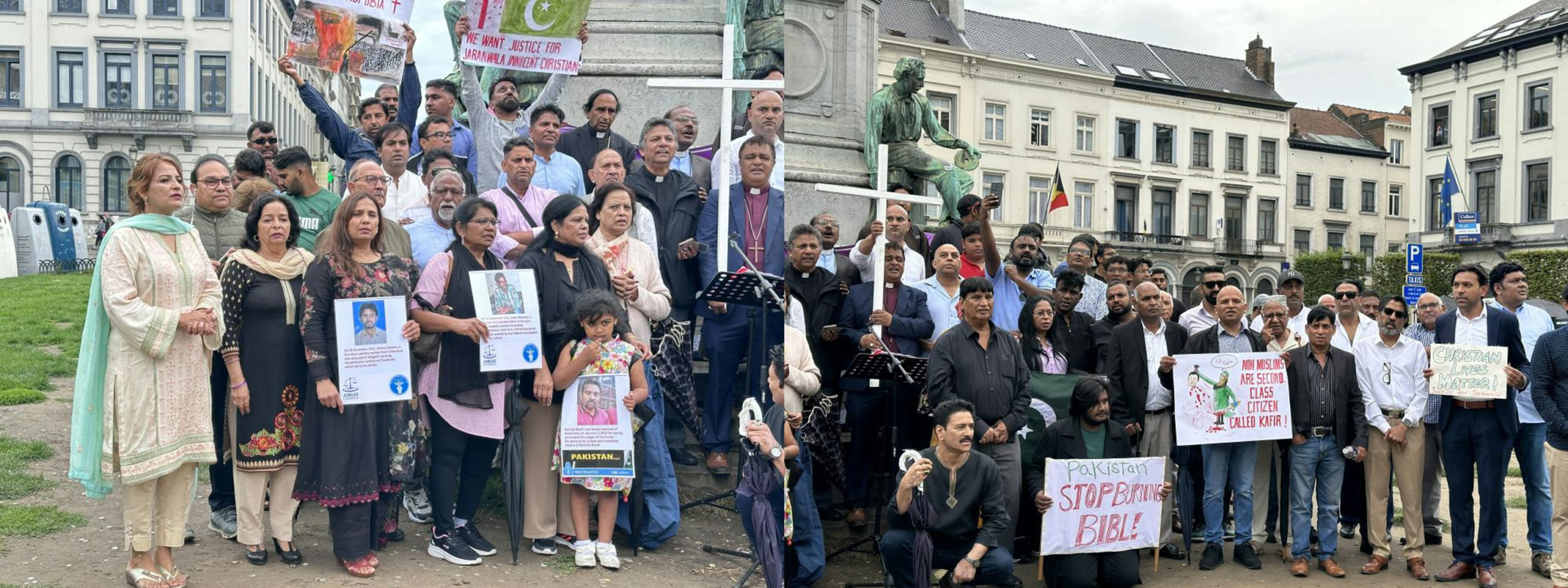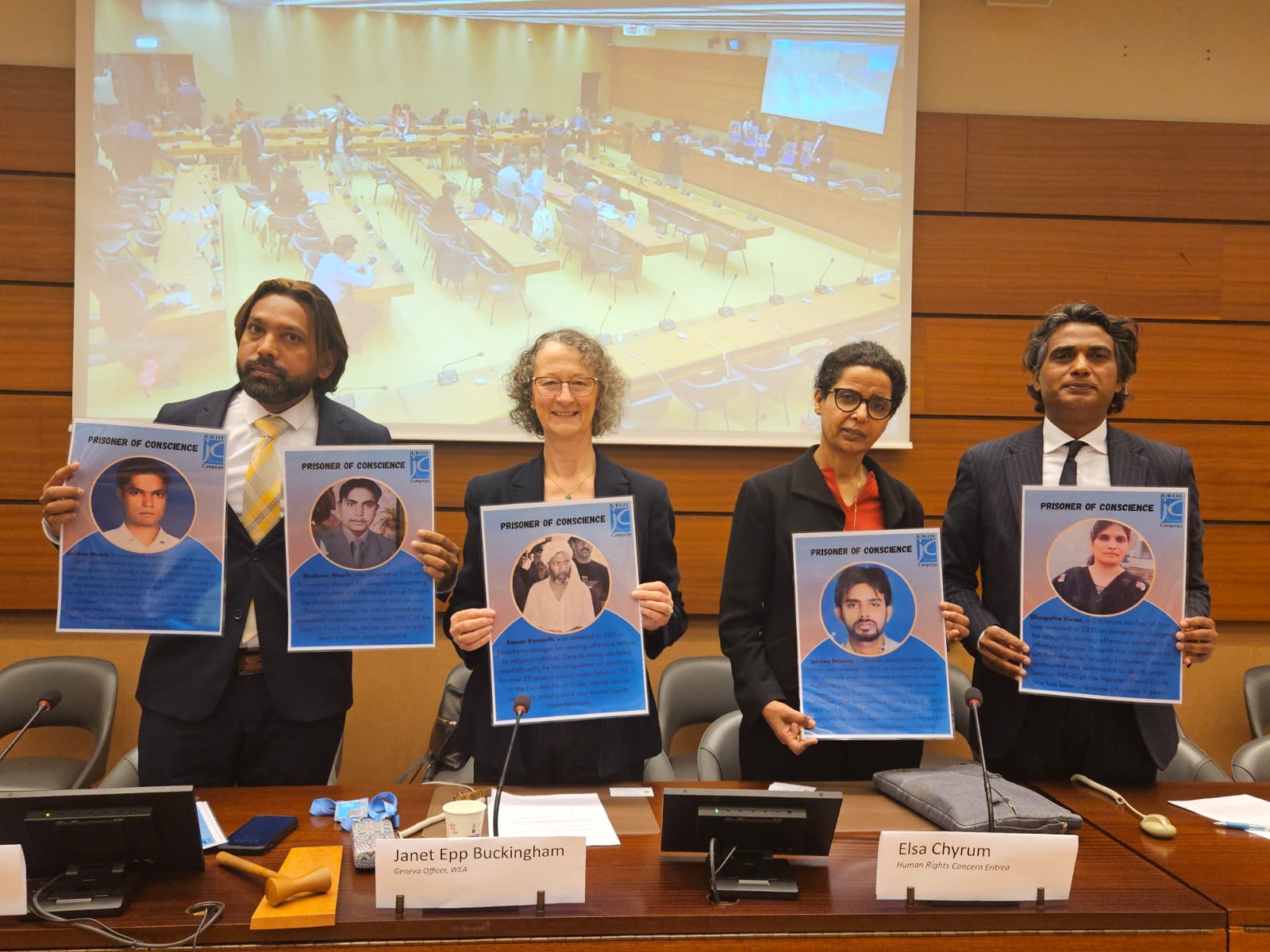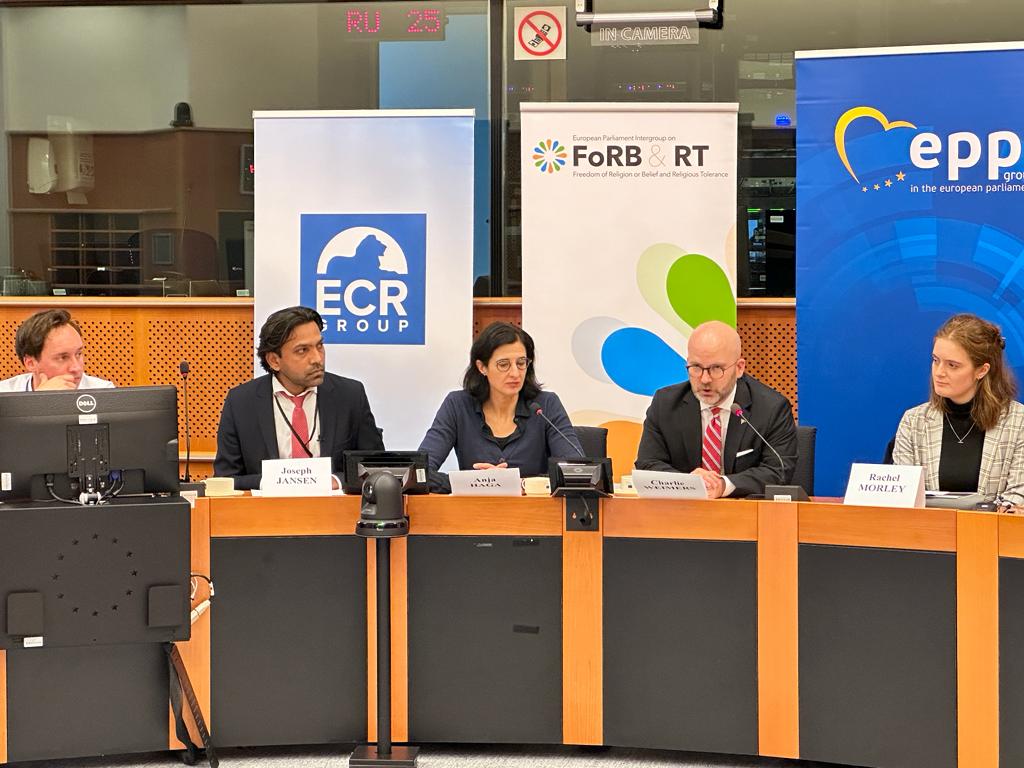Brussels August 24, Pakistan Christians Community Europe staged a protest demonstration in front of the European Parliament in Brussels to show solidarity with Christian victims of mob violence over fabricated blasphemy accusations of ripping pages out of a Quran made against two Christians on 16 August in Jaranwala, Faisalabad district of Pakistan where a mob comprising thousands of Muslims vandalized 24 churches, desecrated hundreds of Holy Bibles, and torched hundreds of homes. The protesters expressed grave concerns over the religious freedom violations and stifling state of freedom of expression in Pakistan, and called upon the European Union to assess Pakistan’s compliance with its human rights obligations before extending it Generalized System of Preferences (GSP) Plus status for another four years.
Speaking at the protest, Joseph Jansen advocacy officer with Jubilee Campaign Netherlands said that we appreciate that the EU is committed to providing emergency humanitarian assistance to support Christians affected by the Jaranwala incident. The EU must urge Pakistani authorities to ensure the safety of those accused of blasphemy in the Jaranwala incident, and ensure that the accused have access to legal representation for a fair trial. Moreover, Pakistan must take measures to implement the recommendations of the judicial inquiry held in the Gojra incident of 2009, in order to prevent the misuse of blasphemy laws. Furthermore, Pakistani authorities must cease their support for the extremist group, Tehreek-e-Labbaik, which enjoys immunity for its illegal actions.
Jansen emphasized that it is the prime responsibility of the EU to assess Pakistan’s progress in implementing 27 international treaties under the GSP+ mechanism, a trade concession Pakistan has been enjoying since 2014. Therefore, the extension of GSP Plus status must not be granted unconditionally, instead, it should be contingent upon Pakistan’s genuine efforts to improve the state of freedom of expression and religion he called on both the Pakistani government and the European Union to engage in constructive dialogue to ensure that the extension of GSP Plus status is tied to tangible steps and verifiable progress in upholding religious freedom and fulfilling its human rights obligations he added that over 90 persons have been extra-judicially killed and minorities have been attacked multiple times on the pretext of blasphemy accusation. Pakistan must consider amending all blasphemy laws to introduce impregnable and effective safeguards, and remove restrictions on religious freedom, and ensure that the accused of blasphemy are not tried under the anti-terrorism act, and receive a fair trial.
Arif Sardar said that every person should have the right to religious freedom without fear of persecution, and nobody should be persecuted for living out their faith. The repressive blasphemy laws create a climate of hostility against religious minorities, and fertile ground for radicals to wreak havoc against those whom they perceive as blasphemers. Pakistan must take measures to detect and counter acts of incitement to hatred, discrimination, and violence against individuals and groups.
Perviaz Bhatti said that religion should never be invoked as a justification for targeting persons belonging to minorities. The correlation between blasphemy laws and mob violence plague and threaten the lives of religious minorities. The scale and severity of the attacks against minorities in Pakistan is unconscionable. Pakistani authorities must take sincere actions to protect Christians at risk, quell the violence, and bring the perpetrators of acts of religious persecution to justice.
Chaudhary Khalid said that the United Nations’ Human Rights Committee has called upon all states to repeal blasphemy laws or amend them in compliance with the strict requirements of the International Covenant on Civil and Political Rights (CCPR). Moreover, the European parliament in 2021 passed a resolution calling on Pakistan to repeal sections 295-B and 295-C of the PPC to respect and uphold the freedom of religion and expression and amend the Anti-Terrorism Act 1997 to avoid trial of blasphemy cases in anti-terrorism courts. However, Pakistan did not introduce any measure to amend or repeal blasphemy laws despite they are incompatible with the Covenant on Civil and Political Rights (CCPR). Instead, Pakistan introduced some regressive developments to make the blasphemy laws stricter.
Latif Bhatti noted that religion is misinterpreted and blasphemy laws are misused for political motives by certain elements that resort to violence to influence policymaking, however, the state remains insensitive and society largely is unaware of the cost of such a skewed polity. He lamented that the parliament passed an amendment act to increase punishment for the accused under section 298-A, which will surely open avenues for its further abuse, allowing complainants to make fabricated blasphemy accusations against individuals they had grudge against. He added that existing blasphemy laws serve as a firewood plank for some religio-political groups to facilitate and perpetrate acts of violence against the accused on the mere accusation of blasphemy. He expressed concerns over the including the charge under section 7 of the Anti-Terrorism Act against blasphemy accused in addition to Section 295-C of the Pakistan Penal Code under the influence of religio-political party is a dangerous practice, and it will make the blasphemy accused more vulnerable, and fuel mob justice.
The demonstration was marked by speeches, placards, and chants demanding justice for victims of the Jaranwala attack on Christians, and calling for reforms in the Pakistani legal system to address the growing concerns over the targeting of religious minorities and dissenting voices.





